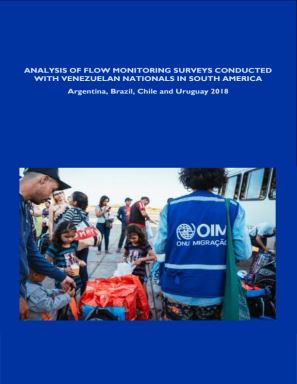-
Countries
-
Data and Analysis
-
Special Focus
-
Crisis Responses
South America — Analysis of Flow Monitoring Surveys Conducted with Venuzuelan Nationals in South America (2018)
IOM conducted surveys between August and November 2018 in Chile, Uruguay, Brazil and Argentina in transit and settlement locations of nationals from the Bolivarian Republic of Venezuela (Venezuela going forward). This report defines three distinct types of monitoring point: first, border points that handle international entries and exits, both land and air; second, settlements and neighborhoods where Venezuelan nationals are concentrated and points where services are provided (such as government and NGO offices) and, lastly, points of internal transit, such as bus terminals in the surveyed countries. The resulting analysis was derived from the responses of 5,958 Venezuelan nationals over 18 years of age: in Brazil (4,124 respondents), Argentina (720 respondents), Chile (715 respondents) and Uruguay (400 respondents).
Key findings:
• The mean age of the respondents was 33 and the median age was 31.
• In general, more males were interviewed than females (55% male and 45% female).
• The main age group interviewed was 26 to 35 years (37% of the total population interviewed). Within this group, more males were interviewed than female (20% and 17% respectively).
• Regarding the marital status of respondents, 68% of males reported being single compared to 66% of female. On the other hand, 30% of females interviewed reported being married or in a civil union versus 31% of males.
• Regarding the level of education of Venezuelans, disaggregated by country, results show that in Argentina and Chile 57% and 46% of respondents had completed a university degree. On average across the four countries 26% of individuals had finished a degree. 4% of those interviewed in Brazil indicated that they had not completed any education.
• 56% of female respondents said that at the time of the survey they were unemployed, versus 47% of male respondents.
• More than half of the females interviewed reported travelling with family, while a third of all the males interviewed indicated travelling this way. 53% of males traveled alone versus 39% of interviewed females.
• The great majority, 92%, of the total individuals interviewed, planned to stay in the country where the survey was conducted, while the remaining 8% indicated that they wanted to continue to travel to another country
